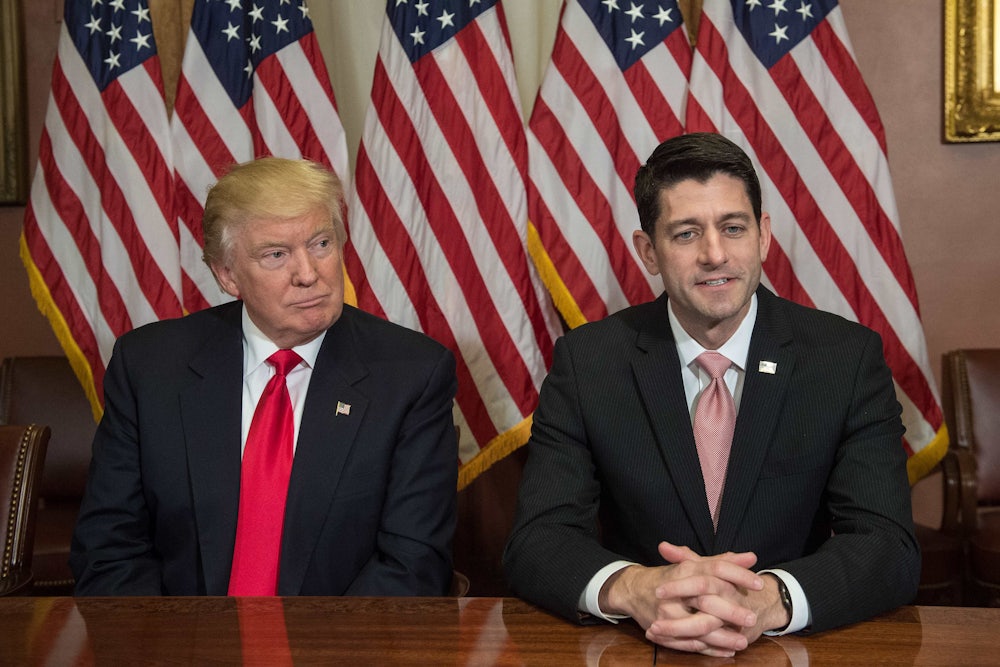In theory, Republicans should be thrilled with their prospects in Washington next year. They will control the presidency, both the House of Representatives and Senate, and can strengthen their hold on the courts. Yet the unified Republican government that House Speaker Paul Ryan has long dreamed of is fraught with contradictions, given President-elect Donald Trump’s numerous policy disagreements with his own party. His protectionism, immigration restrictionism, friendliness to Vladimir Putin, promise to protect programs like Medicare and Social Security, and plan for a trillion-dollar infrastructure bill: all face opposition by a sizable contingent of Republicans in Congress.
How will Republicans hold their ruling coalition together? With mutual fear, it seems.
“Since the election,” Politico reports, “numerous congressional Republicans have refused to publicly weigh in on any Trump proposal at odds with Republican orthodoxy, from his border wall to his massive infrastructure package. The most common reason, stated repeatedly but always privately: They’re afraid of being attacked by Breitbart or other big-name Trump supporters.” Congressional Republicans have many reasons to dread Trump’s populist base, an unruly mob that can easily be incited by media allies of the incoming president. As Republican Congressman Mark Sanford told Politico, “People are naturally reticent to be the first out of the block for fear of Sean Hannity, for fear of Breitbart, for fear of local folks.”
Backing up these accounts, National Review’s Tim Alberta has characterized Republicans in Congress as living under a “culture of intimidation” created by Trump’s over-eager fanbase. Shortly after the election, Freedom Caucus member Raúl Labrador said that any infrastructure spending would have to be offset fully by cuts elsewhere. Now, according to Alberta, “there has been informal talk of accepting a bill that’s only 50 percent paid.... It’s an arrangement Republicans would never have endorsed under a President Hillary Clinton, and a slippery slope to go down with Trump.” (Another Freedom Caucus member, Justin Amash, disputes this report.)
Trump, meanwhile, has ample reason to be scared, too. By refusing to liquidate his business holdings or to place them in a blind trust, he’s created an opening for Congress to investigate and possibly impeach him at any time. (The Emoluments Clause of the U.S. Constitution forbids government officials such as the President from benefitting from their office.) Last Friday, the Brookings Institute released a report, written by two former chief White House ethics lawyers and constitutional law professor Laurence Tribe, that convincingly argued that “it is plain that a President Trump would be subject to removal from office for the intentional abuse of power that this manifestly unconstitutional intermingling of private and public concerns would entail. When this guillotine might fall is a matter of political more than legal calculation, and is thus beyond the scope of our analysis.”
The “political” calculation that Brookings shies away from is a simple one: Republicans in Congress are highly unlikely to go after Trump so long as he remains popular with the party’s base. But if he starts to lose popularity, as George W. Bush did in the last two years of his presidency, then Congress, especially Ryan, will have a strong set of tools to keep Trump in line. Not only will Congress have the usual powers granted by the Constitution as a check on the president, but also a ready-made impeachment case they can push through (and a ready replacement, Vice President–elect Mike Pence, who is much more in sync with the Ryan agenda).
A constitutional crisis of this sort is unlikely. It’s far more likely that Trump and the Republicans in Congress will achieve a modus vivendi, with each side giving into the worst tendencies of the other. Thus, we’ll have a Congress willing to turn a blind eye to Trump’s kleptocracy in exchange for, say, entitlement cuts. A new tolerance for debt will help paper over the differences between Trump’s desire to spend and Republicans’ desire to cut taxes. And, of course, both parties will work swiftly on areas of mutual agreement, like tax cuts, deregulation, and repealing Obamacare. This balance of terror likely will keep the Republican Party united, which is a truly frightening prospect for the rest of us.
